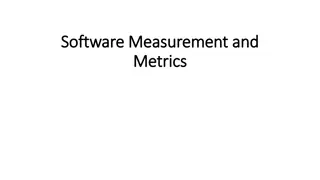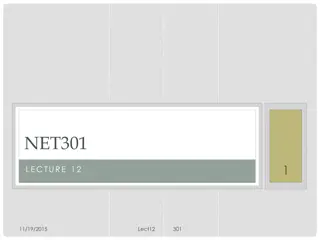System Performance Metrics Overview
Detailed system performance metrics including CPU usage, memory usage, running processes, and resource utilization presented in the form of textual data and images of system slides.
Download Presentation

Please find below an Image/Link to download the presentation.
The content on the website is provided AS IS for your information and personal use only. It may not be sold, licensed, or shared on other websites without obtaining consent from the author. Download presentation by click this link. If you encounter any issues during the download, it is possible that the publisher has removed the file from their server.
E N D
Presentation Transcript
top - 14:43:26 up 25 days, 3:46, 50 users, load average: 0.04, 0.05, 0.01 Tasks: 1326 total, 1 running, 1319 sleeping, 2 stopped, 4 zombie Cpu(s): 0.0%us, 0.1%sy, 0.0%ni, 99.9%id, 0.0%wa, 0.0%hi, 0.0%si, 0.0%st Mem: 16220076k total, 7646188k used, 8573888k free, 246280k buffers Swap: 4194296k total, 3560k used, 4190736k free, 5219176k cached PID USER PR NI VIRT RES SHR S %CPU %MEM TIME+ COMMAND 2801 nobody 20 0 481m 3860 1192 S 1.0 0.0 63:45.33 gmetad 3306 root 20 0 258m 11m 2128 S 0.7 0.1 161:54.86 lsi_mrdsnmpagen 4920 nobody 20 0 297m 18m 3380 S 0.7 0.1 181:11.80 gmond 49781 -------- 20 0 106m 2144 1456 S 0.3 0.0 0:00.10 bash 58119 bpr 20 0 15976 2220 936 R 0.3 0.0 0:00.30 top 106182 -------- 20 0 24584 2184 1136 S 0.3 0.0 2:27.99 tmux 134225 -------- 20 0 143m 1732 608 S 0.3 0.0 0:02.92 intelremotemond ...
- ./paraGraph kbfs com-orkut_117m.graph -t 8 -r top - 15:54:27 up 3 days, 23:58, 6 users, load average: 3.43, 1.15, 0.43 Tasks: 286 total, 2 running, 284 sleeping, 0 stopped, 0 zombie %Cpu(s): 99.8 us, 0.2 sy, 0.0 ni, 0.0 id, 0.0 wa, 0.0 hi, 0.0 si, 0.0 st KiB Mem: 32844548 total, 31305468 used, 1539080 free, 435012 buffers KiB Swap: 7999484 total, 13176 used, 7986308 free. 27364456 cached Mem PID USER PR NI VIRT RES SHR S %CPU %MEM TIME+ COMMAND 23457 bpr 20 0 1559584 979704 3420 R 796.4 3.0 0:27.91 paraGraph 1071 root 20 0 75892 6560 5564 S 2.0 0.0 19:58.05 cups-brows+ 21506 root 20 0 87680 17300 5460 S 0.7 0.1 1:08.43 cupsd 23408 bpr 20 0 24956 3196 2588 R 0.3 0.0 0:00.18 top 1 root 20 0 36100 4204 2632 S 0.0 0.0 0:01.02 init
$ tail -n 1 bpr_grade_performance.job time ./grade_performance.py ./$exe /usr/bin/time ./paraGraph kbfs com-orkut_117m.graph -t 8 r ... 33.16user 0.10system 0:05.54elapsed 600%CPU (0avgtext+0avgdata 979708maxresident)k 0inputs+0outputs (0major+5624minor)pagefaults 0swaps
$./paraGraph pagerank -t 8 -r soc-pokec_30m.graph $gprof % cumulative self self time seconds seconds 69.35 0.43 0.43 1 430.00 430.00 build_incoming_edges(graph*) 30.65 0.62 0.19 18 10.56 10.56 pagerank(graph*, ...) 0.00 0.62 0.00 1632803 0.00 0.00 addVertex(VertexSet*, int) 0.00 0.62 0.00 7 0.00 0.00 newVertexSet(T, int, int) 0.00 0.62 0.00 7 0.00 0.00 freeVertexSet(VertexSet*) total calls ms/call ms/call name
./paraGraph -t 8 -r pagerank /afs/cs/academic/class/15418-s16/public/asst3_graphs/soc- pokec_30m.graph': 2366.633970 task-clock (msec) # 1.758 CPUs utilized 109 context-switches # 0.046 K/sec 9 cpu-migrations # 0.004 K/sec 6,168 page-faults # 0.003 M/sec 7,513,900,068 cycles # 3.175 GHz (83.23%) 6,327,732,886 stalled-cycles-frontend # 84.21% frontend cycles idle (83.42%) 4,019,403,839 stalled-cycles-backend # 53.49% backend cycles idle (66.86%) 3,222,030,372 instructions # 0.43 insns per cycle # 1.96 stalled cycles per insn (83.43%) 457,170,532 branches # 193.173 M/sec (83.30%) 12,354,902 branch-misses # 2.70% of all branches (83.24%) So what is the bottleneck?
201,493,787 cache-references 49,347,882 cache-misses # 24.491 % of all cache refs
Samples: 11K of event 'cache-misses', Event count (approx.): 181771931 Overhead Command Shared Object Symbol 47.18% paraGraph paraGraph [.] edgeMapS<State<float> > 46.84% paraGraph paraGraph [.] build_incoming_edges 2.70% paraGraph [unknown] [k] 0xffffffff813b2537 1.37% paraGraph [unknown] [k] 0xffffffff813b2915
Samples: 13K of event 'cycles', Event count (approx.): 11108635969 Overhead Command Shared Object Symbol 65.93% paraGraph paraGraph [.] edgeMapS<State<float> > 27.66% paraGraph paraGraph [.] build_incoming_edges 1.85% paraGraph paraGraph [.] vertexMap<Local<float> > 1.02% paraGraph [kernel.kallsyms] [k] clear_page_c 0.88% paraGraph paraGraph [.] addVertex 0.60% paraGraph [kernel.kallsyms] [k] copy_user_generic_string
| bool update(Vertex s, Vertex d) | { | float add = pcurr[s] / outgoing_size(graph, s); 2.97 | divss %xmm1,%xmm0 5.22 | jmp 162 | nop |160: mov %eax,%edx | #pragma omp atomic | pnext[d] += add; 0.16 |162: mov %edx,0x18(%rsp) 1.28 | mov %edx,%eax 0.01 | movss 0x18(%rsp),%xmm2 2.71 | addss %xmm0,%xmm2 4.63 | movss %xmm2,0x18(%rsp) 1.16 | mov 0x18(%rsp),%r15d 3.99 | lock cmpxchg %r15d,(%rcx) 25.22 | cmp %eax,%edx | jne 160 1. OMP atomic -> lock cmpxchg 2. This instruction is 25%*65% of execution time
Samples: 48K of event 'cycles', Event count (approx.): 39218498652 Overhead Command Shared Object Symbol 63.78% paraGraph paraGraph [.] edgeMapS<RadiiUpdate> 19.33% paraGraph paraGraph [.] edgeMap<RadiiUpdate> 8.21% paraGraph paraGraph [.] build_incoming_edges 3.88% paraGraph paraGraph [.] vertexMap<VisitedCopy>
bool update(Vertex src, Vertex dst) { | bool changed = false; | for (int j = 0; j < NUMWORDS; j++) { | if (visited[dst][j] != visited[src][j]) { 0.11 | mov 0x0(%r13),%rax 0.21 | mov (%rax,%rdi,1),%rbp 0.20 | mov (%rax,%rcx,8),%rax 14.88 | mov 0x0(%rbp),%ebp 1.15 | mov (%rax),%eax 68.27 | cmp %eax,%ebp 0.02 | je 108 | // word-wide or | __sync_fetch_and_or(&(nextVisited[dst][j]), visited[dst] 1.54 | mov 0x8(%r13),%rcx 0.34 | or %eax,%ebp 0.02 | mov (%rcx,%rdi,1),%rcx 0.31 | lock or %ebp,(%rcx) | int oldRadius = radii[dst]; | if (radii[dst] != iter) { 6.45 | mov 0x18(%r13),%ebp
DRAM Bandwidth (GB/sec) Execution Time (ms) Graph Initialization kBFS Iterations
DRAM Bandwidth (GB/sec) Execution Time (s) Graph Initialization kBFS Iterations
... ==29991== HEAP SUMMARY: ==29991== in use at exit: 2,694,466,576 bytes in 2,596 blocks ==29991== total heap usage: 16,106 allocs, 13,510 frees, 3,001,172,305 bytes allocated ==29991== ==29991== LEAK SUMMARY: ==29991== definitely lost: 112 bytes in 1 blocks ==29991== indirectly lost: 0 bytes in 0 blocks ==29991== possibly lost: 7,340,200 bytes in 7 blocks ==29991== still reachable: 2,687,126,264 bytes in 2,588 blocks ==29991== suppressed: 0 bytes in 0 blocks
==1902== ERROR: AddressSanitizer: heap-buffer-overflow on address 0x7f683e4c008c at pc 0x41cb77 bp 0x7f683bc14a20 sp 0x7f683bc14a18 READ of size 4 at 0x7f683e4c008c thread T6 #0 0x41cb76 (paraGraph+0x41cb76) #1 0x7f6852efdf62 (/usr0/local/lib/libiomp5.so+0x89f62) #2 0x7f6852ea7ae3 (/usr0/local/lib/libiomp5.so+0x33ae3) #3 0x7f6852ea620a (/usr0/local/lib/libiomp5.so+0x3220a) #4 0x7f6852ecab80 (/usr0/local/lib/libiomp5.so+0x56b80) #5 0x7f684fdb7b97 (/usr/lib/x86_64-linux-gnu/libasan.so.0.0.0+0x18b97) #6 0x7f684efa4181 (/lib/x86_64-linux-gnu/libpthread-2.19.so+0x8181) #7 0x7f684f2b447c (/lib/x86_64-linux-gnu/libc-2.19.so+0xfa47c) ...
// Pin calls this function every time a new basic block is encountered. // It inserts a call to docount. VOID Trace(TRACE trace, VOID *v) { // Visit every basic block in the trace for (BBL bbl = TRACE_BblHead(trace); BBL_Valid(bbl); bbl = BBL_Next(bbl)) { // Insert a call to docount for every bbl, passing the number of instructions. BBL_InsertCall(bbl, IPOINT_ANYWHERE, (AFUNPTR)docount, IARG_FAST_ANALYSIS_CALL, IARG_UINT32, BBL_NumIns(bbl), IARG_THREAD_ID, IARG_END); } }
// Print a memory write record and the number of instructions between // previous memory access and this access VOID RecordMemWrite(UINT32 thread_id, VOID * addr) { // format: W - [total num ins so far] - [num ins between prev mem access and this access] - [address accessed] total_counts[thread_id]++; files[thread_id] << "W " << total_counts[thread_id] << " " << icounts[thread_id] << " " << addr << std::endl; reset_count(thread_id); }
./paraGraph bfs -t 8 -r soc- pokec_30m.graph

 undefined
undefined























